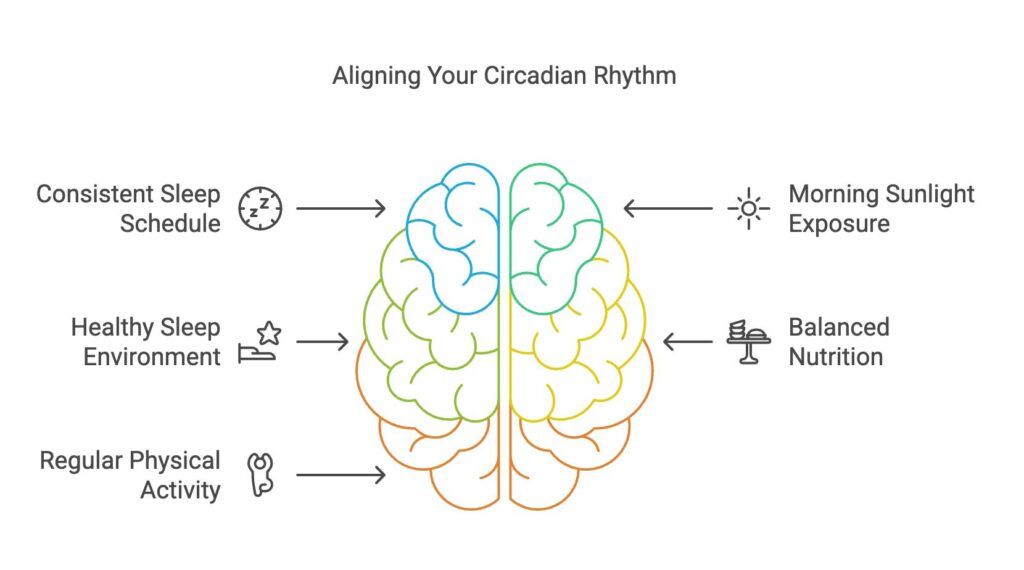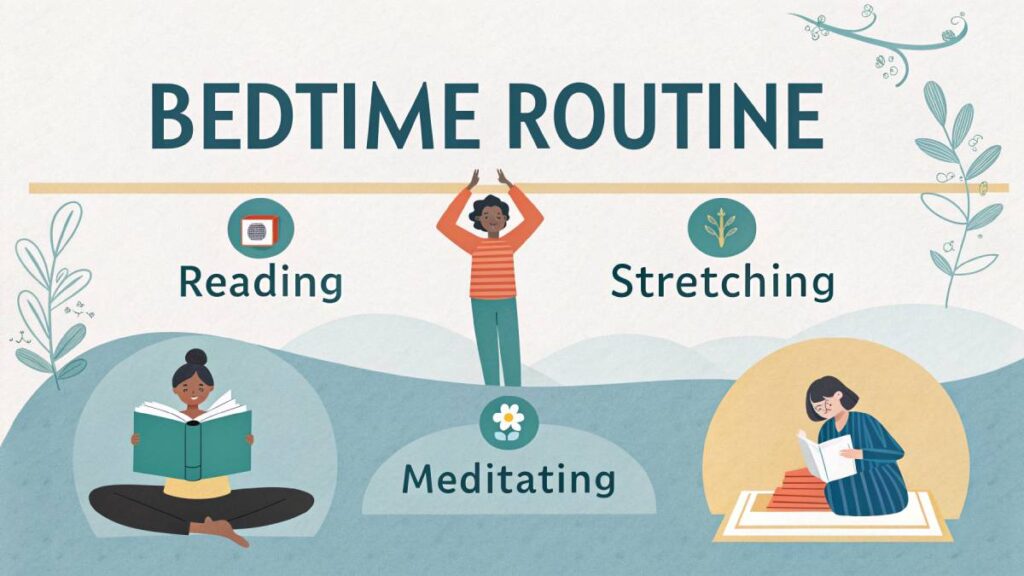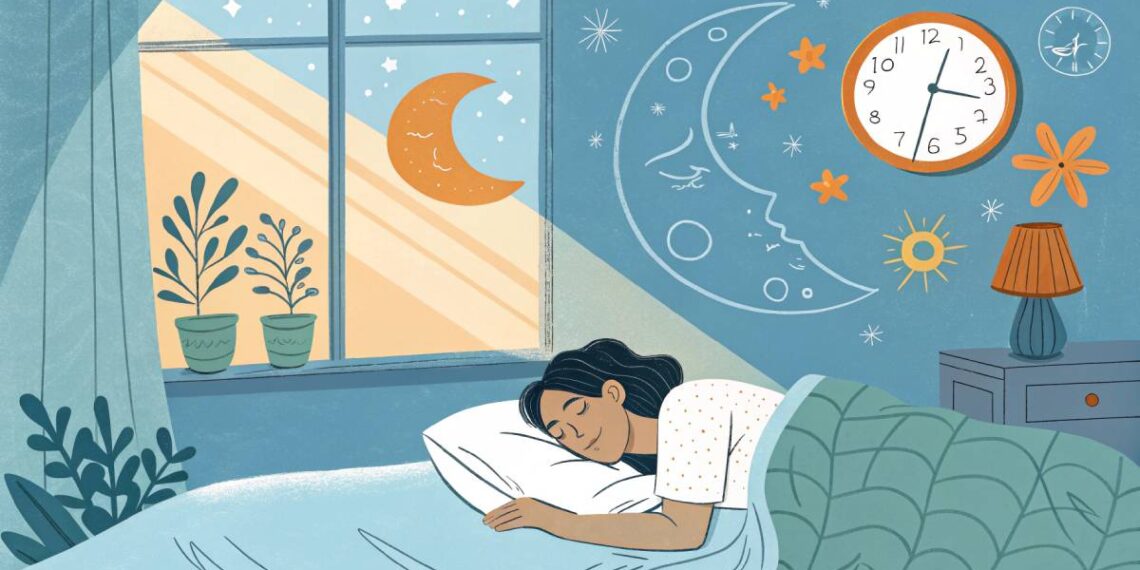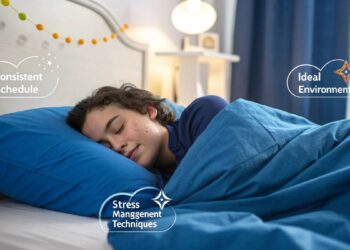Ever wondered why you feel energized in the morning but drag through the day? Meet your circadian rhythm—the body’s natural timing maestro orchestrating sleep, mood, and overall health. This invisible force ensures you’re alert when the sun shines and ready to rest as darkness falls. By tuning into your circadian rhythm, you can enhance sleep quality, boost your mood, and maintain peak mental and physical health. Let’s dive into how this internal clock works and how you can harmonize it with your daily life for a more vibrant, balanced existence.
Key Takeaways
- Regulates Sleep-Wake Cycles: Maintains consistent sleep patterns for better rest.
- Enhances Mood and Focus: Balances hormones like serotonin and cortisol.
- Boosts Physical Health: Supports immune function, metabolism, and cardiovascular health.
- Impacts Nutrition and Exercise: Influences meal timing and exercise benefits.
- Promotes Mental Well-being: Reduces risks of anxiety, depression, and cognitive decline.
Understanding Circadian Rhythm
What is Circadian Rhythm?
Circadian rhythm—it’s like the body’s own timing device, ticking away to regulate when you feel ready to catch some Z’s or spring out of bed like a caffeinated squirrel. This natural rhythm works tirelessly behind the scenes, influencing stuff like when you feel hungry, when your body thinks it’s time to chill, and even how your hormones play their part. It’s all orchestrated by the brain’s hypothalamus, with sunlight being the conductor. Keeping this clock in tune means you’re bright-eyed in the a.m. and ready to snooze when darkness rolls in.
When the tweedle-dee timepiece aligns with actual day and night, everything seems to fall in place—sleep comes easy, and days are fab!

Importance of a Healthy Circadian Rhythm
A happy circadian rhythm isn’t just about making mornings less painful. Messing with this rhythm can turn snooze dreams into nightmares of sleepless nights, cranky moods, and dragging around like a zombie. It’s like the unsung hero, playing a big part in keeping you bouncing with health and vibrancy.
A well-regulated circadian rhythm is the cornerstone of good health, influencing everything from sleep quality to metabolic processes.” – Dr. Michael Breus
Top Perks of Keeping Your Circadian Rhythm in Check:
| Perk | What It Does for You |
|---|---|
| Better Sleep Quality | Regular sleep schedules become your best friend, making waking up and winding down a breeze. |
| Mood Boost | Coordinates heavy hitters like serotonin and cortisol for a happier vibe. |
| Sharper Brain Cells | Keeps your memory and focus crystal clear, like a mental agility coach. |
| Steadier Energy | Ensures no sudden battery drain sensation mid-day—steady as she goes instead. |
| Tip-Top Health | Supports healthy weight, hearts, and keeps the immune guard on duty. |
Get your rhythm grooving, and perhaps the sleep meds can take a back seat. Fancy trying something natural for better sleep? Dive into more cool reads like best natural sleep aids and essential oils for sleep. Need a head start on dreamy nights? Peek into how to fall asleep naturally for some snappy tips.
Signs of a Disrupted Circadian Rhythm
Our body’s internal clock, aka the circadian rhythm, is like the maestro of sleep-wake cycles. When it hits a bad note, it can throw off more than just sleep—your whole health groove might feel off.
“Resetting your circadian rhythm isn’t just about better sleep—it’s about unlocking your body’s full potential.” – Dr. Satchin Panda
Common Symptoms of Circadian Rhythm Disruption
Spotting a short-circuited circadian rhythm early can help folks recalibrate their sleep naturally. Look for:
- Insomnia: Can’t fall asleep or stay that way? Yep, that’s one.
- Excessive sleepiness: Dragging through the day like a tired sloth.
- Irregular sleep patterns: Your snooze schedule looks more like a yo-yo, often thanks to night shifts.
- Concentration problems: Attention span of a goldfish? Could be this.
- Mood swings: Going from sunshine to thunderstorm in seconds.
Effects of a Disrupted Circadian Rhythm on Health
Rattling your sleep clock isn’t just about missing shut-eye. It could wreak havoc in other ways too. Here’s how:
| Health Effect | Description |
|---|---|
| Reduced immunity | Catching colds faster than a speeding bullet. |
| Metabolic problems | Waistline expanding, diabetes knocking, metabolism stumbling. |
| Cardiovascular issues | Heart playing a risky game, pushing you closer to disease and high blood pressure. |
| Mental health disorders | Anxiety and depression gatecrash the party. |
| Cognitive decline | Brain feels like it’s running on dial-up internet—slow and spotty. |
Want more scoop on handling sleep and health? Swing by our post on natural sleep solutions and manage sleep anxiety.
Fixing these hiccups can often vibe with Mother Nature’s toolkit. Set a regular sleep schedule, soak up some sunshine, and make your sleep zone as cozy as a bear’s den. For more hacks, check out how to fall asleep naturally and best natural sleep supplements.
Tips to Reset Your Circadian Rhythm Naturally
Messing with your sleep can be a real pain, but worry not! There are simple ways to get your body clock back on track. Let’s dive into some practical tips for better sleep.
Establishing a Consistent Sleep Schedule
One of the best tricks in the book to reset your body clock is sticking to a consistent sleep schedule. Going to bed and waking up at the same time every day—even when Netflix tempts you on weekends—helps keep your body’s internal clock ticking smoothly.
| Day | Bedtime | Wake-Up Time |
|---|---|---|
| Monday | 10:00 PM | 6:00 AM |
| Tuesday | 10:00 PM | 6:00 AM |
| Wednesday | 10:00 PM | 6:00 AM |
| Thursday | 10:00 PM | 6:00 AM |
| Friday | 10:00 PM | 6:00 AM |
| Saturday | 10:00 PM | 6:00 AM |
| Sunday | 10:00 PM | 6:00 AM |
Staying regular helps your body fall in line with the natural day-night cycle, no caffeine required.

Maximizing Light Exposure
Sunshine is your buddy when it comes to waking up. Getting some natural light in the morning tells your body it’s daytime, so aim to spend about half an hour outdoors first thing.
On the flip side, say adios to screens and their pesky blue light before bed. Too much of that can mess with your melatonin levels and keep you tossing and turning. Curious about how cutting down on screen time can help? Check out our handy guide on digital detox sleep benefits.
Optimizing Your Sleep Environment
Making your bedroom the ultimate sleep haven is a game-changer. Here’s how to pimp your sleep zone:
- Temperature: Keep it chill, around 60-67°F (15-19°C) for optimal snooze.
- Noise: Silence the world with earplugs or a white noise machine.
- Light: Blackout curtains are your BFFs; a sleep mask can be a bonus.
- Comfort: A comfy mattress and supportive pillows work wonders. Need more ideas? Our piece on the best mattress for sleep is a must-read.
And don’t forget to have a bedtime routine that signals “wind down, relax.” Whether it’s a good book, a soak in a warm bath, or a go at meditation for sleep, these pre-sleep rituals can work wonders.
By giving these natural strategies a go, you’ll be well on your way to resetting that body clock and catching the best z’s of your life. For more tips, peek at our resources on natural sleep solutions and bedtime routine for adults. Sweet dreams await!
Healthy Sleep Habits
Catching some good z’s isn’t just a dream — it’s a total game changer for how your body’s internal clock ticks. Let’s explore why keeping your sleep game strong is a top priority and uncover some down-to-earth ways to get your snooze on.
Importance of Good Sleep Hygiene
Cracking the code to a night of restful sleep is all about setting the stage for solid, undisturbed snooze time. If you’re aching for a reset on what time your body likes to crash and rise, here’s the inside scoop:
- Stick to a Sleep Schedule: Hitting the sack and greeting the day at the same time every morning and night sets your body’s internal timepiece on the right course. Our handy guide on consistent sleep habits has more tips to get you sorted.
- Create a Cozy Sleep Environment: Dial up your snooze zone — keep it cool, dark, and quiet for an epic night’s rest. Check out how to ace a welcoming sleep cave.
- Dodge the Stimulants: Caffeine, nicotine, and alcohol are sneaky saboteurs of sleep. Leave those behind as you get cozy for the night.
- Ditch the Screens: Give your phone and TV the snub before bed to boost sleep quality. Peek at our story on benefits of a digital detox.
- Mind Your Meals: Munch on balanced grub and steer clear of big, late-night meals to keep sleep on track. Hungry for more? Our piece on a snooze-friendly diet serves it up fresh.

Relaxation Techniques for Better Sleep
Unwinding before bed helps your body hit the pause button and glide into dreamland. Here’s the lowdown on relaxing the stress outta sleep:
- Deep Breathing: Ease into sleep with slow, deep breaths — inhale through your nose, hold a beat, and exhale through your mouth. Repeat and relax.
- Progressive Muscle Relaxation: Go muscle by muscle, flex and release from toe to noggin, kicking out tension along the way.
- Meditation: Sprinkle some zen into bedtime to melt away stress and get in a snooze bliss. Dig into our piece on meditation tips for rest.
- Aromatherapy: Add some lavender magic with some oil to set a sleepy mood. Check our take on sleepy scents that work wonders.
- Gentle Stretches or Yoga: Basic stretches or chill yoga flows can relax muscles pre-slumber. Dive into our yoga moves to snooze for ideas.
- Mood Music: Sweet tunes or white noise can blanket you in tranquility, making it easy to drift off.
By nailing these sleep-friendly habits and zen-worthy techniques, reset your body clock and score better shut-eye. Need more stories? Peruse our savvy sleep guide for adults.
| Technique | Description |
|---|---|
| Deep Breathing | Calm yourself with steady, slow breaths |
| Progressive Muscle Relaxation | Ease tension by flexing and easing each muscle |
| Meditation | Mindfulness to kick stress to the curb |
| Aromatherapy | Chill out with soothing scents like lavender |
| Light Stretching or Yoga | Easy poses to calm the body |
| Listening to Calming Music | Enjoying peaceful sounds to drift into slumber |
Want more natural sleep hacks? Hit up our sleep solutions without meds page.
Nutrition and Circadian Rhythm
Foods that Support Healthy Sleep Cycles
Eating the right stuff can be a game-changer for your sleep schedule. Certain snacks pack a punch of good sleep vibes that can get your body clock back on track. These munchies are chock-a-block with goodies like melatonin, tryptophan, magnesium, and other sleepytime helpers.
| Food Type | Sleepy Ingredients |
|---|---|
| Tart Cherries | Melatonin |
| Almonds | Magnesium |
| Kiwi | Serotonin and Folate |
| Fatty Fish | Omega-3, Vitamin D |
| Warm Milk | Tryptophan |
| Bananas | Potassium, Magnesium |
Adding these eats to your grub can help tune up your body clock. If you’re hunting for ways to catch some Z’s naturally, dive into these snacks. Get the lowdown on other sleep-friendly eats in our scoop on foods for better sleep.

Timing of Meals and Its Impact on Sleep
When you eat can be just as important as what you eat. Grabbing food at odd hours or too close to hitting the sack can mess with your snooze routine. Keeping a steady chow schedule and dodging the midnight munchies can keep your internal clock in sync.
| Meal Timing | When to Eat (Before Bed) | Sleep Perk |
|---|---|---|
| Breakfast | Within 1 hour of waking | Kicks off morning energy |
| Lunch | Around midday | Keeps your energy flowing |
| Dinner | 2-3 hours pre-bedtime | Keeps the snooze smooth |
Cutting back on hefty or caffeine-heavy nosh before bed can also lead to better sleep. Peek at our guide for more tips on diet for better sleep.
Trying out these food tricks can help align your body clock naturally, which is a win for folks battling with sleepless nights, shift workers, and anyone on the hunt for non-medicated shut-eye.
Physical Activity and Sleep
Getting active does wonders for catching those zzz’s, especially when trying to get that body clock ticking like Swiss timepiece. Knowing how exercise and sleep buddy up can guide folks in choosing habits that make snooze-time more blissful.
Benefits of Exercise on Sleep
Working out gives your slumber a serious boost, making it a natural fix to consider. Here’s what breaking a sweat can do for your snooze stats:
- Kickstart falling asleep
- Rack up more minutes on the sleep meter
- Enhance overall sleep goodness
- Tame those pesky insomnia gremlins
- Balance your body clock like a pro
| Benefit | Description |
|---|---|
| Quicker Goodnight | Less tossing, more dozing off. |
| Longer Sleep Playtime | More hours in dreamland. |
| Better Rest | Deeper, revitalizing sleep. |
| Insomnia Antidote | Helps diminish insomnia distress. |
| Clock Calibration | Gets your inner timekeeper in sync. |
For anyone plagued by sleepless nights or seeking to cut back on sleep meds, making exercise a habit could flip the script. It meshes well with other natural strategies for smoothing out the sleep-wake groove.

Best Timing for Physical Activity to Improve Sleep
Getting active is fab for slumber, but when you break a sweat plays a big part in setting that body clock straight.
- Breaking Dawn Workouts:
- A good sweat session in the a.m. can back up your body’s rise-and-shine cues.
- Pairing early exercise with a splash of sunlight tightens up that circadian beat.
- Midday Burn:
- Afternoon sweat can work wonders by boosting your core temp, setting the stage for a cool down that smooths the path to bedtime.
- Great for high-octane cardio without crashing the nighttime sleep party.
- Night Moves:
- Contrary to some chatter, nighttime workouts might not really cramp everyone’s sleep style—just steer clear of out-of-control intensity before bed to keep from revving up when you should be winding down.
| Time of Day | Impact on Sleep |
|---|---|
| Morning | Solidifies wake-up calls and aligns the internal clockwork. |
| Afternoon | Heats up the body’s core, paving way for night-time coolness. |
| Evening | Cool for mod activity, but dodge intense late workouts. |
Timing your workout like a symphony can unlock exercise’s sleepy-time magic while resetting your circadian rhythm like a boss. For more tricks on hitting the hay right, mosey over to our thoughts on eat-and-sleep harmony and calming pre-bedtime rituals.
Seeking Professional Help
When counting sheep just ain’t cutting it, and bedtime yoga’s not doing the trick, it might be time to bring in the pros for a little extra backup in resetting that sleep schedule of yours.
Consultation with a Sleep Specialist
Think of a sleep specialist as a detective for all things slumber-related. They’re the folks who know the ins and outs of sleep issues and can help unravel the mystery of your restless nights. With their expertise, they can nose out why your internal clock’s gone haywire. For those who can’t ditch their nighttime pills or have insomnia that just won’t quit, a chat with one of these experts can be super beneficial.
When you sit down with them, they might suggest you track your zzz’s or maybe dive into a sleep study. This info helps in crafting a game plan just for you. They’ll dish out tips on sleep-friendly habits and maybe spill the beans on natural snooze boosters. It’s kinda like teaming up with articles about falling asleep nice and easy and getting zen for sleep.
When to Consider Chronotherapy
Now, if your sleep’s got more twists and turns than a soap opera, chronotherapy might just save the day. This technique sort of nudges your sleep and wake times back on track gently over time. It’s a lifesaver for night owls who work the graveyard shift or parents whose little night owls aren’t giving them a break.
Chronotherapy is worth a shot when nothing else seems to click. It’s particularly handy for those grappling with Delayed Sleep Phase Disorder (DSPD) or its opposite, Advanced Sleep Phase Disorder (ASPD).
| Disorder | What’s the Deal | What It Does to You |
|---|---|---|
| DSPD | Running on L.A. time in N.Y. | You’re wide awake till the wee hours and struggle to drag yourself out of bed in the morning. |
| ASPD | Early bird to the extreme | You conk out too early and find yourself up way before the world. |
Chronotherapy’s something you’ll want to do with a sleep doc on board. They’ll keep a watchful eye and tweak things as needed. And if you need more sleep hacks, you might find some solid advice in the articles on the perks of unplugging for shut-eye and setting up a bedroom that says ‘nap time’.
For those tangled up in a never-ending sleep battle, these professional avenues might be your ticket to peaceful, refreshing slumber.

Mindfulness and Relaxation
Adding a bit of mindfulness and some chill vibes into your day might just make your nights a lot better! If you’ve been tossing and turning with stress and anxiety keeping you up, these relaxation tricks could work wonders.
Stress Reduction Techniques for Better Sleep
Stress and sleep: the famous frenemy duo. One stresses you out; the other throws your sleep out the window. Luckily, there are ways to cool those stress jets and tuck in better:
- Breathe Deep: Set aside some “breathing time” before hitting the hay. Breathe in through your nose nice and slow, hold it, then let it out through your mouth like a slow sigh. It’s like an off switch for your brain’s chaos mode.
- Muscle Chillin’: Play a little game with your muscles. Tighten then relax each muscle group from your toes up to your head. Feel the tension fade away as you go.
- Dear Diary: Scribble down whatever’s buzzing in your brain before lights out. Spill those anxious thoughts on paper so they don’t tag along to bed.
- Book It: Grab a book and read a little before bed. Go for paperbacks or e-ink so you’re not glared at by screens. This can help you drift away from worries. Check out our stress and sleep solutions for a deeper dive.
Incorporating Meditation into Your Bedtime Routine
Meditation’s like a little bedtime whisper, telling your body clock, “Hey, chill out!” Here’s how it can weave into your bedtime:
- Guided Ease: Plug into a guided meditation app that talks you into relaxation with stories or scenes. They’re the lullabies for grown-ups.
- Just Breathe: Pay homage to your breath, without letting any judgments crash the party. It keeps you in the moment and anxiety knows it’s not invited.
- Body Radar: Tune into your body, head to toe, acknowledging every sensation like you’re politely saying hello to an old friend.
- Spread Some Love: Whisper wishes of kindness to yourself and others in your thoughts. This kind of meditation wraps you in a warm blanket of calm.
If you want to master these bedtime zen moves, check out our meditation for sleep guide.
Using these chill-out tactics can really kick those sleep worries to the curb. Peek at our articles on getting cozy without meds at atural sleep solutions and best natural sleep aids for more tips.
Main Tips
- Maintain a Consistent Sleep Schedule: Go to bed and wake up at the same time every day.
- Maximize Morning Sunlight: Spend at least 30 minutes outdoors in natural light each morning.
- Optimize Your Sleep Environment: Keep your bedroom cool, dark, and quiet with comfortable bedding.
- Limit Screen Time Before Bed: Reduce exposure to blue light at least an hour before bedtime.
- Incorporate Relaxation Techniques: Practice deep breathing, meditation, or gentle yoga to unwind.
Conclusion
Understanding and maintaining a healthy circadian rhythm is pivotal for both your physical and mental well-being. By establishing consistent sleep schedules, maximizing natural light exposure, and optimizing your sleep environment, you can significantly improve sleep quality and overall health. Incorporating healthy sleep habits, such as avoiding stimulants and engaging in relaxation techniques, further supports your body’s internal clock. Additionally, mindful nutrition and regular physical activity play crucial roles in synchronizing your circadian rhythm, enhancing both your energy levels and mood. When natural methods aren’t enough, seeking professional help can provide tailored solutions to reset your sleep patterns effectively. Embracing these strategies not only ensures restorative sleep but also fosters a balanced, vibrant lifestyle. Take charge of your circadian rhythm today and unlock the path to better health and happiness.
FAQs
What is circadian rhythm and why is it important?
Circadian rhythm is your body’s internal clock that regulates sleep-wake cycles, hormone release, and other vital functions. Maintaining a healthy circadian rhythm ensures better sleep quality, mood stability, and overall health.
How can I improve my circadian rhythm naturally?
You can improve it by maintaining a consistent sleep schedule, maximizing morning sunlight exposure, reducing screen time before bed, optimizing your sleep environment, and incorporating regular physical activity.
What are the signs of a disrupted circadian rhythm?
Common signs include insomnia, excessive sleepiness, irregular sleep patterns, concentration problems, and mood swings.
Can diet affect my circadian rhythm?
Yes, eating the right foods at appropriate times can support a healthy circadian rhythm. Consuming foods rich in melatonin, magnesium, and tryptophan can enhance sleep quality.
When should I exercise to best support my sleep?
Morning or early afternoon workouts are ideal as they help synchronize your internal clock. Avoid intense exercise close to bedtime to prevent disrupting your sleep.
Resources
- National Sleep Foundation
- Mayo Clinic on Circadian Rhythms
- Harvard Health Publishing
- Sleep Research Society
- American Psychological Association
Final Thoughts
Mastering your circadian rhythm is a transformative journey towards enhanced well-being and vitality. By aligning your daily habits with your body’s natural clock, you unlock the potential for deeper sleep, improved mood, and better overall health. Remember, small changes like adjusting your sleep schedule, increasing morning light exposure, and fostering a restful sleep environment can have profound impacts. Embrace these practices consistently, and don’t hesitate to seek professional guidance if needed. Your body clock is a powerful ally—tune it right, and reap the benefits of a harmonious, energized life. Take these insights to heart and start your path to a healthier, more balanced you today!
Recommended Products
- Philips Wake-Up Light Alarm Clock
Start your day with natural sunrise simulation for gentle waking. - Miroco White Noise Machine
Create a tranquil sleep environment with customizable soundscapes. - Nature’s Bounty Melatonin Tablets
Support your natural sleep cycle with high-quality melatonin supplements. - Sleep Master Adjustable Blackout Curtains
Ensure complete darkness for optimal sleep with these blackout curtains. - Fit Simplify Resistance Loop Exercise Bands
Incorporate evening stretching or yoga into your nightly routine with these versatile bands.






